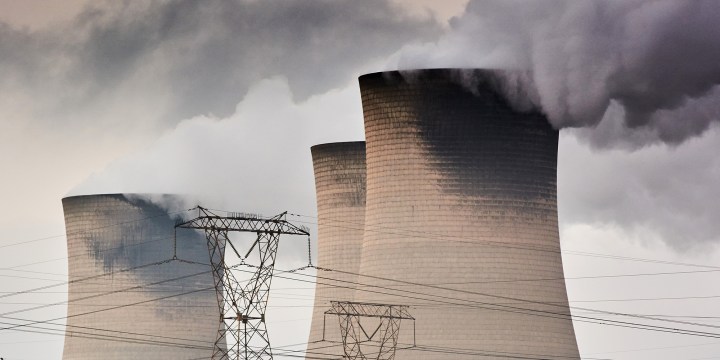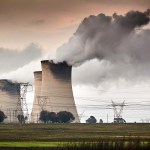TOXIC BURDEN OP-ED
Shutting down coal is a matter of conscience — just ask the victims of Mpumalanga’s deadly air

What President Cyril Ramaphosa’s energy crisis plan did not mention, even once, is the ongoing toxic air pollution being spewed forth by the same coal power stations that we’re now trying to fix. It’s almost as if the public health emergency that is the Mpumalanga Highveld does not exist.
The man with the yellow vest who has been keeping an eye on our cars parked in Vosman township outside Emalahleni walks me to my car. His chest wheezes as he stands next to the vehicle, giving me directions to get back to the N4. I ask if he suffers from asthma, and he nods distractedly. Here on the Mpumalanga Highveld, everyone struggles to breathe.
It was July, and my Centre for Environmental Rights colleagues and I were in Emalahleni to join community members and activists to celebrate a huge court and campaign victory: a few months earlier, community-based organisation Vukani Environmental Justice Movement in Action (VEM) and environmental justice NGO groundWork had won a major court victory against the state in the so-called “Deadly Air” case.
The Deadly Air judgment held, for the first time, that the poor air quality on the Highveld was a violation of the constitutional right to a healthy environment. The court ordered the government to pass regulations to implement and enforce the Highveld Priority Area Air Quality Management Plan, which is aimed at cleaning up the air on the Highveld to meet health-based air quality standards.
President’s plan
That same evening in July, the president announced his energy crisis plan. The energy plan is a mixed bag of measures that include significantly accelerating the renewable energy capacity (unfortunately most of it privately owned, with State Capture relieving Eskom of any chance of its own renewable energy build), but also fixing the coal power plants that have been plagued by breakdowns.
What the president’s energy crisis plan did not mention, even once, is the ongoing toxic air pollution being spewed forth, in gross violation of the Constitution and air quality laws, by the same coal power stations that we’re now trying to fix. It’s almost as if the public health emergency that is the Mpumalanga Highveld does not exist.
The Deadly Air judgment was an extraordinary victory, the first of its kind, particularly for the activists from VEM, who made personal sacrifices to bring this case to court. Incomplete as the struggle for clean air on the Highveld is, a court’s vindication of the ongoing suffering of these activists and their families meant more to them than I can describe here.
Disappointingly, the state has appealed against parts of the Deadly Air judgment to the Supreme Court of Appeal. There is not yet a date for the hearing of the appeal, but rest assured, the courtroom in Bloemfontein will be packed that day — with mothers and grandmothers and children from the Highveld.
‘Bloodline’ myth
VEM activists tell the story of how they painstakingly debunked the myth, popular in Mpumalanga, that asthma was a “bloodline” condition, carried from generation to generation. Individual interviews with asthma sufferers revealed that people from Emalahleni who go home to the rural areas find themselves miraculously cured of symptoms; only when they return to Emalahleni do the tight chests, the coughing and wheezing, and the burning eyes return.
The Deadly Air judgment accepts that more than 10,000 people die prematurely every year because of the air pollution on the Highveld. Since the case was launched in June 2019, more than 30,000 people have died earlier than they would have, had they lived somewhere less polluted.
If 30,000 people have lost their lives prematurely from breathing the Highveld’s polluted air since 2019, imagine the scale of the suffering from asthma, bronchitis and other respiratory and cardiac conditions this pollution has caused over these past decades.
Babies whose health has been compromised by air pollution while still in the womb. Parents who take a child with respiratory illness to the doctor here in Emalahleni are frequently told that the best medicine would be for the family to move away from the area. Few families can afford to do so.
Visit Daily Maverick’s home page for more news, analysis and investigations
Human rights violation
So when we talk about the “energy mix”, having discussions about how we need to retain coal-fired power for “baseload” and “we have so much coal” and “but China is still building coal power plants” and “it is now our turn for coal-based development”, how is it possible that we are not talking about stopping the human rights violation that is the coal pollution on the Highveld?
Let’s talk for a moment about those actually responsible for the air pollution on the Highveld. Expert research conducted by Dr Andrew Gray, submitted as evidence in the Deadly Air case, shows that Eskom’s 12 coal-fired power stations, Sasol Synfuels in Secunda and the nearby NatRef refinery are responsible for the lion’s share of the air pollution in the Highveld Priority Area.
Are these companies ready to face a class action by air pollution victims for the loss of life, health, income and medical costs incurred by parents trying to keep their kids alive?
How will we compensate the people of the Highveld for sacrificing their health so that we can have electricity from coal, especially when clean alternatives are available? What does restorative justice look like for them? Do we need a pollution tax to fund a public health response? Would an “air charge” for polluters who use and pollute the air change corporate behaviour?
Public health burden
This leads us to another pertinent question: how much could we save our public health system if we cleaned up the Highveld’s air?
In 2017, UK expert Dr Mike Holland estimated that Eskom power station pollution alone cost the state R30-billion a year in hospital admissions and lost working days. Imagine all the ways this money could be better spent, and how freeing our hospitals from the burden of pollution would free up precious public health capacity for other challenges.
How radically would the lives of ordinary people living in Mpumalanga be improved if they didn’t have to deal with chronic and acute disease on top of all the other social and economic ills with which they have to contend?
Prof Rajen Naidoo from the University of KwaZulu-Natal describes how air pollution contributes to the cycle of poverty — how poor people cannot move away from the pollution, only to find their education and development opportunities are impaired by pollution, and their resulting poor health prevents them from earning income that would allow them to relocate to escape the pollution. And don’t forget that these pollution victims are largely black.
So for those arguing that we should “sacrifice” clean air and compliance with air quality standards because it’s too expensive, and because we now have to choose between load shedding for all and toxic air for some, think again. Pollution is an extremely costly burden — for individuals, for families, for the state.
And check your conscience. Have we become so comfortable with the sacrifice made by those living in the polluted Highveld that we don’t even consider their suffering anymore?
In Emalahleni, I found this written on a poster made by one young resident: “Oooh this pollution. Will I live to the age of 15?” OBP/DM
Melissa Fourie is the Executive Director of the Centre for Environmental Rights.




















Comments - Please login in order to comment.